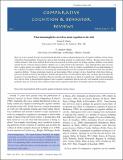What hummingbirds can tell us about cognition in the wild.
Abstract
Here we review around 20 years of experimental data that we have collected during tests of cognitive abilities of free-living, wild rufous hummingbirds Selasphorus rufus at their breeding grounds in southwestern Alberta. Because these birds are readily trained to feed from artificial flowers they have proved a useful system for testing cognitive abilities of an animal outside the box wherein animal cognitive abilities are so often tested in the laboratory. And, although these data all come from a single species in a single location, the long-term aim of this work is to make a contribution to our understanding of the evolution of cognitive abilities, by examining the relationship between the ecological demands these birds face and their cognitive abilities. Testing predictions based on our knowledge of their ecology we have found that, while these birds aggressively defend a territory and display to females during the time we train and test them, they can learn and remember the locations of rewarded flowers, what those flowers look like, and when they are likely to contain food. Small-brained though they may be, these 3g hummingbirds appear to have cognitive capabilities that are not only well matched to their ecological demands, they are in at least some instances better (more capacious) than those of animals tested in the laboratory.
Citation
Healy , S D & Hurly , T A 2013 , ' What hummingbirds can tell us about cognition in the wild. ' , Comparative Cognition & Behavior Reviews , vol. 8 , pp. 13-28 . https://doi.org/10.3819/ccbr.2013.80002
Publication
Comparative Cognition & Behavior Reviews
Status
Peer reviewed
ISSN
1911-4745Type
Journal article
Collections
Items in the St Andrews Research Repository are protected by copyright, with all rights reserved, unless otherwise indicated.

